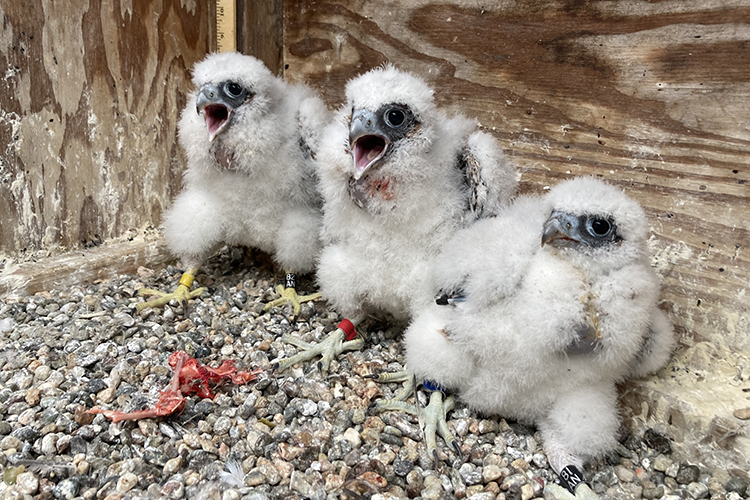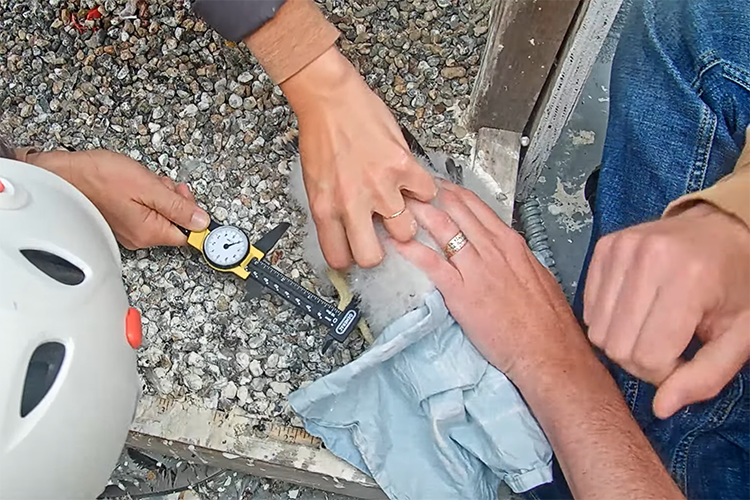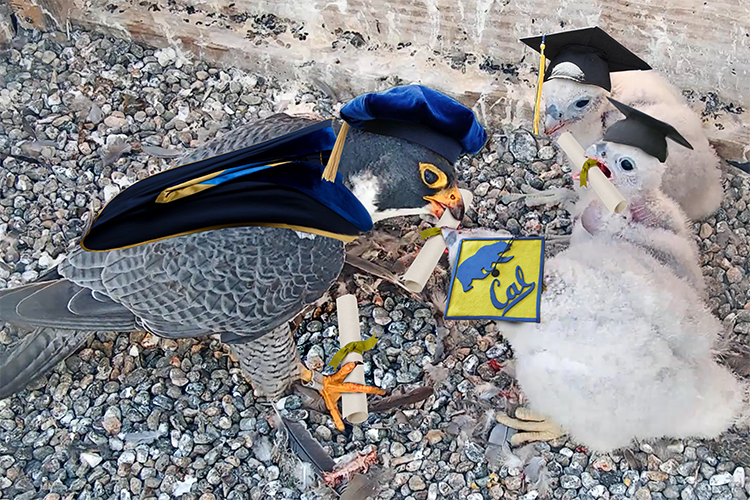Oh, boy! Time to name Berkeley’s three new falcon brothers
Live Cal Falcons Q&A today at noon will provide news about this morning's banding and the naming contest
May 12, 2021

May 12 was Banding Day for the campus’s newest peregrine falcon chicks. Turns out they’re all males that will be running and practicing flapping their wings by the end of the month. (Cal Falcons image)
UC Berkeley’s three new peregrine falcon chicks got human visitors this morning, including an ornithologist who banded the young birds and determined their gender. The latest? They’re brothers, and they now need names, which you can propose, starting today, through the Cal Falcons‘ annual public naming contest that kicks off at noon.
The contest — instructions will appear at noon on Cal Falcons’ Instagram, Facebook and Twitter sites — runs through this Sunday, May 16, with the top suggested sets of three names, including a set proposed by youngsters, going up for a final vote starting Monday, May 17. The winning names will be announced Thursday. May 20.
Also at noon today, Cal Falcons will hold a livestreamed Q&A. Sean Peterson and Lynn Schofield, who run the social media program for Berkeley’s falcons, will talk about this morning’s banding by Dr. Zeka Glucs, director of the Santa Cruz Predatory Bird Research Group, and answer questions from those tuning in. A video of the entire banding process can be seen here and lasts about 40 minutes.

In the Campanile, Dr. Zeka Glucs, director of the Santa Cruz Predatory Bird Research Group, measures one of the falcon chick’s legs to identify its sex. (Cal Falcons image)
“The chicks looked to be in great health,” said Peterson, a Berkeley Ph.D. student in Berkeley’s Department of Environmental Science, Policy and Management, who assisted Glucs at the nest in the Campanile. “They’d eaten breakfast right before we banded them. They were developing very well and were all a very good size, given their age.”
“Now that we know they’re males, they’ll probably be on the early side of the fledging window,” he added, referring to the stage where the young birds acquire the feathers necessary for flight and independent activity. “Based on previous years, we’re expecting the two older chicks to fledge around May 28 to 29 and maybe May 31 for the younger chick.”
Schofield, who is a biologist in Sonoma County at the Institute for Bird Populations, said the brothers — the 2021 offspring of falcon parents Annie and Grinnell — will start to venture out of the nest box in the next week or so and begin exploring the top of the Campanile.

Two of the falcon brothers watch the third get banded on Wednesday morning, May 12, in the Campanile. (Cal Falcons image)
“By the last week of May,” she said, “we will expect them to be running around practicing their flapping, perching and potentially hunting any moths they encounter on top of the tower.”
The chicks’ gender was determined by the width of their legs, right above their feet, said Peterson, adding that their leg bones are fully developed by this age. Males’ leg bones are thinner at that part of the leg then those of females. Since they are smaller than females, who need more time to develop feathers to support a bigger body, male fledglings take flight first.
Each chick received two bands, said Peterson. The first was issued by the national Bird Banding Laboratory and has a unique nine-digit number that differentiates the chick from all other birds banded in North America. That band number is associated with all the data collected for the bird at the time of banding. The numbers are small and difficult to see if you’re not in close contact with the bird.

This Photoshopped image by Cal Falcons shows father falcon Grinnell awarding diplomas to his three chicks to recognize their next stage in life — being banded and named. (Cal Falcons image)
The second band has only four characters in much larger type that can be seen through binoculars from afar. This four-character code is enough to differentiate the falcon from other falcons in the region.
“The colors are just tape put onto the birds’ Bird Banding Laboratory bands so we can easily tell who is who while they are still in the nest,” said Peterson.
The yearly naming contest always involves kids’ suggestions, and names for the falcon babies suggested by youngsters can be posted here. On Saturday, May 22, the Berkeley Public Library will be partnering with Cal Falcons to hold a special program for youth on the raptors living in the Bay Area. The library also will be a partner in deciding which set of three names suggested by kids will be included in the final vote.
Last year’s three falcon chicks were named Poppy, Redwood and Sequoia. In 2019, Carson and Cade got their names. The three chicks born in 2018 were named Berkelium, Californium and Lawrencium, and the first chicks born in the tower were Fiat and Lux.